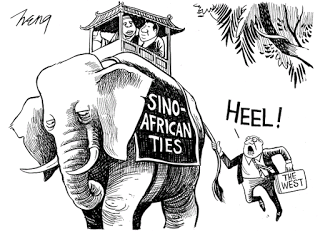The
Government of the People’s Republic of China (PRC) on Monday announced
its plans to embark on about 750 billion (N228, 525 trillion) U.S.
dollars outbound investment in the next five years.
The
Consul-General of the People’s Republic of China in Lagos, Mr Chao
Xiaoliang, disclosed this in an article made available to the News
Agency of Nigeria (NAN) in Lagos.
Consul-General of the People’s Republic of China in Lagos, Mr Chao
Xiaoliang, disclosed this in an article made available to the News
Agency of Nigeria (NAN) in Lagos.
Chao also said that China would be importing goods worth about 8 trillion U.S. dollars (about N2, 437.6 trillion) from different
countries in the next five years.
countries in the next five years.
“China
is going to import 8 trillion U.S. dollars worth of goods from the
world and make 750 billion U.S. dollars in outbound investment in the
next 5 years.
is going to import 8 trillion U.S. dollars worth of goods from the
world and make 750 billion U.S. dollars in outbound investment in the
next 5 years.
“China will adopt a
series of new measures to pursue further opening, including to
substantially widen its market access and create a more attractive
investment environment,’’ he said.
series of new measures to pursue further opening, including to
substantially widen its market access and create a more attractive
investment environment,’’ he said.
According
to him, China does not deliberately pursue a trade surplus, instead
China has gradually shifted its export-oriented economy to a domestic
consumption-driven one.
to him, China does not deliberately pursue a trade surplus, instead
China has gradually shifted its export-oriented economy to a domestic
consumption-driven one.
Chao said that in the first quarter of this year, China’s trade
surplus had narrowed by 23.2 per cent from the previous year.
surplus had narrowed by 23.2 per cent from the previous year.
The
consul-general, who recalled a recent trade friction between China and
the U.S., called for stronger cooperation between both
countries, instead of tension and confrontation.
consul-general, who recalled a recent trade friction between China and
the U.S., called for stronger cooperation between both
countries, instead of tension and confrontation.
“The recent trade friction between China and the U.S. has drawn
increasing concern worldwide. The U.S. claimed that its trade deficit with China is due to `unfair trade practices’.
increasing concern worldwide. The U.S. claimed that its trade deficit with China is due to `unfair trade practices’.
“The trade imbalance between the two countries is mainly a result of different economic structures, and an inevitable result of
international division of labour.
international division of labour.
“There
should be stronger cooperation between China and the U.S., instead of
tension and confrontation. This will not only benefit our two countries
but will also promote world peace, stability and prosperity,’’ he said.
should be stronger cooperation between China and the U.S., instead of
tension and confrontation. This will not only benefit our two countries
but will also promote world peace, stability and prosperity,’’ he said.
The
U.S. and China have an extremely extensive economic partnership, a
great amount of trade between the two countries necessitates somewhat
positive political relations, yet significant issues exist.
U.S. and China have an extremely extensive economic partnership, a
great amount of trade between the two countries necessitates somewhat
positive political relations, yet significant issues exist.
It is a relationship of economic cooperation, hegemonic rivalry in the Pacific and mutual suspicion over the other’s intentions.
Therefore,
each nation has adopted a wary attitude regarding the other as a
potential adversary, whilst at the same time being an extremely strong
economic partner.
Therefore,
each nation has adopted a wary attitude regarding the other as a
potential adversary, whilst at the same time being an extremely strong
economic partner.
It has been described by world leaders and academics as the world’s most important bilateral relationship of the century.
As
of 2018, the US has the world’s largest economy and China has the
second largest, although China has a larger Gross Domestic Product (GDP)
when measured by Purchasing Power Parity (PPP).
of 2018, the US has the world’s largest economy and China has the
second largest, although China has a larger Gross Domestic Product (GDP)
when measured by Purchasing Power Parity (PPP).
The US has greater national wealth.





